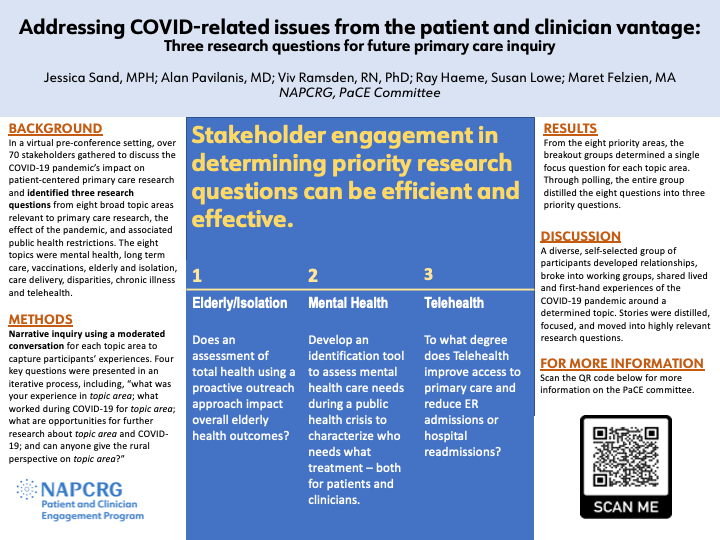PCR004: Addressing COVID-related issues from patient and clinician vantage: Three research questions for future primary care inquiry
Maret Felzien, MA; Vivian Ramsden, PhD, BSN, MS, RN, MCFP (Hon.); Alan Pavilanis, MD; Jessica Sand, MPH; Raymond Haeme, MS
Context: In a virtual pre-conference setting, over 70 participants gathered to discuss the COVID-19 pandemic’s impact on patient-centered primary care research and identified three research questions from eight broad topic areas relevant to primary care research, the effect of the pandemic, and associated public health restrictions. The topics were mental health, long term care, vaccinations, elderly and isolation, care delivery, disparities, chronic illness and telehealth. Objective: To capture stories from participants’ experiences and identify primary care research topics in each of the COVID-19 related areas through a series of guided questions led by a PaCE Council member. Study Design: Narrative inquiry using a moderated conversation for each topic areas to capture participants’ experiences. Four key questions were presented in an iterative process, including, “what was your experience in topic area; what worked during COVID-19 for topic area; what are opportunities for further research about topic area and COVID-19; and can anyone give the rural perspective on topic area?” Setting: PaCE Preconference at 2020 NAPCRG Annual Meeting managed through Zoom and Zoom Breakout rooms. Participants worked in small groups for more intimate conversations. Population: 71 self-selected, diverse participants including front-line providers, patients, community partners and researchers from Canada, the US, New Zealand, Ireland and the UK. Forty-four participants were first time attendees to a PaCE event. Results: From eight priority areas, the breakout groups determined a single focus question for each topic area. Through polling, the entire group distilled the eight questions into three priority questions relating to the pandemic: 1. Elderly/Isolation: Does an assessment of total health using a proactive outreach approach impact overall elderly health outcomes? 2. Mental Health: Develop an identification tool to assess mental health care needs during a public health crisis to characterize who needs what treatment – both for patients and clinicians. 3. Telehealth: To what degree does Telehealth improve access to primary care and reduce ER admissions or hospital readmissions? Conclusions: A diverse, self-selected group of participants developed relationships, boke into working groups, shared lived and first-hand experiences of the COVID-19 pandemic around a determined topic, distilled and focused the stories, and moved those into highly relevant research questions.

Jack Westfall
jwestfall@aafp.org 11/19/2021wow, great work. go PaCE. this is terrific. thanks